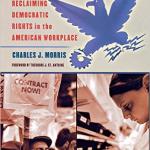Board Member Opens Door for Members-Only Bargaining

Ten years ago, Charles Morris wrote a book called “The Blue Eagle at Work,” where he argued that under the National Labor Relations Act employers have a duty to bargain with minority unions on a members-only basis. After the book came out, the Steelworkers Union asked the NLRB’s General Counsel to issue a complaint based on Morris’s theory, and in a case called Dick’s Sporting Goods, the General Counsel responded with an Advice Memo rejecting the theory. And that’s where things stood until Board Member Hirozawa issued a little-noticed concurring opinion as his term came to an end last month. Hirozawa, writing only for himself, offered an interpretation of Section 8(a)(5) of the NLRA that would arguably require employers to bargain with minority unions.
Section 8(a)(5) provides that it is an unfair labor practice for an employer “to refuse to bargain collectively with the representatives of his employees, subject to the provisions of Section 9(a).” Section 9(a) provides that a representative selected by a majority of employees shall be the exclusive bargaining representative of all employees in a bargaining unit. The conventional view of Section 8(a)(5), as reflected in the Dick’s Sporting Goods Advice Memo, is that the phrase “subject to the provisions of Section 9(a)” in Section 8(a)(5) means that the duty to bargain only applies where the majority of employees have selected a bargaining representative. But, in his concurring opinion in Children’s Hospital and Research Center of Oakland, 364 NLRB No. 114 (2016), Member Hirozawa rejected that interpretation. Instead, he pointed out that in Section 8(a)(3) Congress used the phrase “if such labor organization is the representative of the employees as provided in section 9(a),” and thus, Congress would have used that same language if that’s what it meant in Section 8(a)(5). Member Hirozawa concluded that there is no requirement that a union be a section 9(a) exclusive representative for an employer to have a duty to bargain under Section 8(a)(5).
The Children’s Hospital case did not directly address members-only unions. Instead, the issue was whether an employer still has to deal with a decertified union on grievances that arose before the union was decertified. As a result, Member Hirozawa had no occasion to state the circumstances under which he would require an employer to bargain with a minority union. And the two other Board Members on the panel, Members McFerran and Miscimarra dropped a footnote saying that they “express no views” on Member Hirozawa’s concurrence. In other words, it’s a long way from a concurrence by one departing Board Member to an opinion by a Board majority. But, a concurring opinion by a highly respected Board Member will likely encourage proponents of members-only bargaining to make another run at the full Board.
